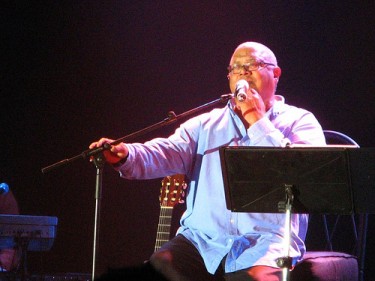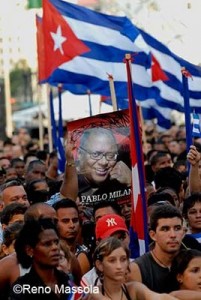On August 27, 2011, Cuban music legend Pablo Milanés performed for the first time in his career in South Florida, at Miami's American Airlines Arena. On Cuba-focused blogs and news sites, bitter disagreement over the event’s political significance reverberated in the weeks surrounding Milanés’ performance.
The concert provoked the outrage of many anti-Castrist Cubans in Miami, who staged protests outside of the arena, calling Milanés an “emissary” and a “minion” of the revolutionary government.
Milanés has lived on the island since he was born in 1943. In the 1960s, he and fellow folk singer Silvio Rodríguez were among the originators of nueva trova, a unique style that blended traditional folk music with strong political messages supporting the revolutionary movement. The two became cultural icons and their music deeply embedded in the social currents of communism and socialism both in Cuba and throughout Latin America.
Unlike Rodríguez, who has remained an unflinching supporter of the revolution to the present day, Milanés’ relationship with Cuba’s political regime is more difficult to decipher.
In mid-August, Milanés gave an interview to El Nuevo Herald, in which he discussed his position. “I believe in the [socialist] system, but not in the men who implement it,” he told reporter Sarah Moreno. He discussed his critiques of the Castro government after the death of political prisoner Orlando Zapata Tamayo and his public refusal to support the jailing of 75 Cuban journalists in the 2003, an event now known as the Black Spring. Milanés also openly denounced travel restrictions that the Cuban government places on most citizens.
In a post entitled “Gregorio Milanés o Pablo Samsa?” [es], Carlos Rodríguez Almaguer, writing on the Cuba-based blog of Yohandry Fontana, accused Milanés of turning against the Cuban revolution and pandering to anti-Castro sentiment in Miami.
Habría que preguntarse cómo Pablo ha podido saltar del sitial en que el pueblo cubano lo ha mantenido por largo tiempo al pantano moral en que hoy se hunde con cada nueva declaración.
Responding to a comment on his own blog, Segunda Cita [es], Silvio Rodríguez weighed in on the conversation:
Coincido con Pablo en muchos de sus juicios críticos sobre la realidad cubana. Lo que escandaliza a algunos no es el contenido de sus críticas sino la forma, que además de burda parece desamorada, sin el más mínimo compromiso afectivo. Otra cosa que duele es que haya manifestado esas críticas en Miami, a unos días de [su] concierto…
On the opposite side of the political spectrum, Milanés did not fare much better. Alberto de la Cruz of the Miami-based Babalu wrote:
I would love to hear Pablito make this same call for more freedom in Cuba to the international press right before he performs a concert at the Karl Marx Theater in Havana. That of course will never happen, because the only time pigs don't squeal is when they are feeding at the trough.
Edmundo García, a Cuban reporter living in Miami, wrote an open letter to Milanés that was reproduced on numerous blogs, including Kaos en la Red [es], accusing Milanés of pandering to both sides of the controversy for nothing but his own benefit.
Sin esa Revolución a la que tantas manchas le ve y a la que tanto critica; sin esos dirigentes que la hicieron y hoy la reforman y perfeccionan junto al pueblo cubano; sin las dinámicas que generaron la estética cultural en la cual el querido Pablo se insertó para beneficio de su crecimiento como artista, no hubiera pasado (pienso yo) de ser un bolerista con una guitarra en un bar de Bayamo, o en el mejor de los casos de La Habana.
On Café Fuerte [es], Milanés posted on open response to García’s critique, accusing García of having moved to Miami’s “ultra right.” Directly addressing García, he wrote:
[Estás] ingresando en ese grupo selecto de la ultraderecha miamense que no admite reconciliaciones, críticas…[No] quieres amor, quieres odio, tú al igual que ellos, no quieres reconciliación, quieres rencores y desunión…no quieres al pueblo cubano, ni de allá ni de acá. Edmundo, tú no quieres a nadie…
While many outspoken anti-Castrist bloggers condemned Milanés, El Blog del Compañero [es] took his comments seriously, arguing that criticism from a figure like Milanés could have a serious impact on Cuban leaders.
Al leer estas declaraciones pienso que quienes deben estar sudando con cada gira de Pablo Milanés a los Estados Unidos y al mundo son los ancianos militares que oprimen a Cuba.
[…]
No creo este tipo de critica sea “preparada” ni coreografiada, sino espontánea y auténtica.
After reading [Milanés’] statements I think that those who should be sweating with each tour that Milanés does in the United States and the world are the old militants who oppress Cuba.
[…]
I don’t think this kind of criticism was “prepared” or choreographed, but rather spontaneous and authentic.
El Compañero also noted that if Milanés were to make similar critiques while in Cuba, they would probably not be reported by the Cuban press. In order to work internationally, but to remain on the island, Cuban artists are often made to walk a very delicate line. Milanés expressed hope that his concert in Miami could form a bridge of reconciliation between Cubans on and off the island. But this controversy has proven that for an artist like Milanés, whose music was so strongly associated with the Revolution in its youth, it remains difficult to reach such aims.








